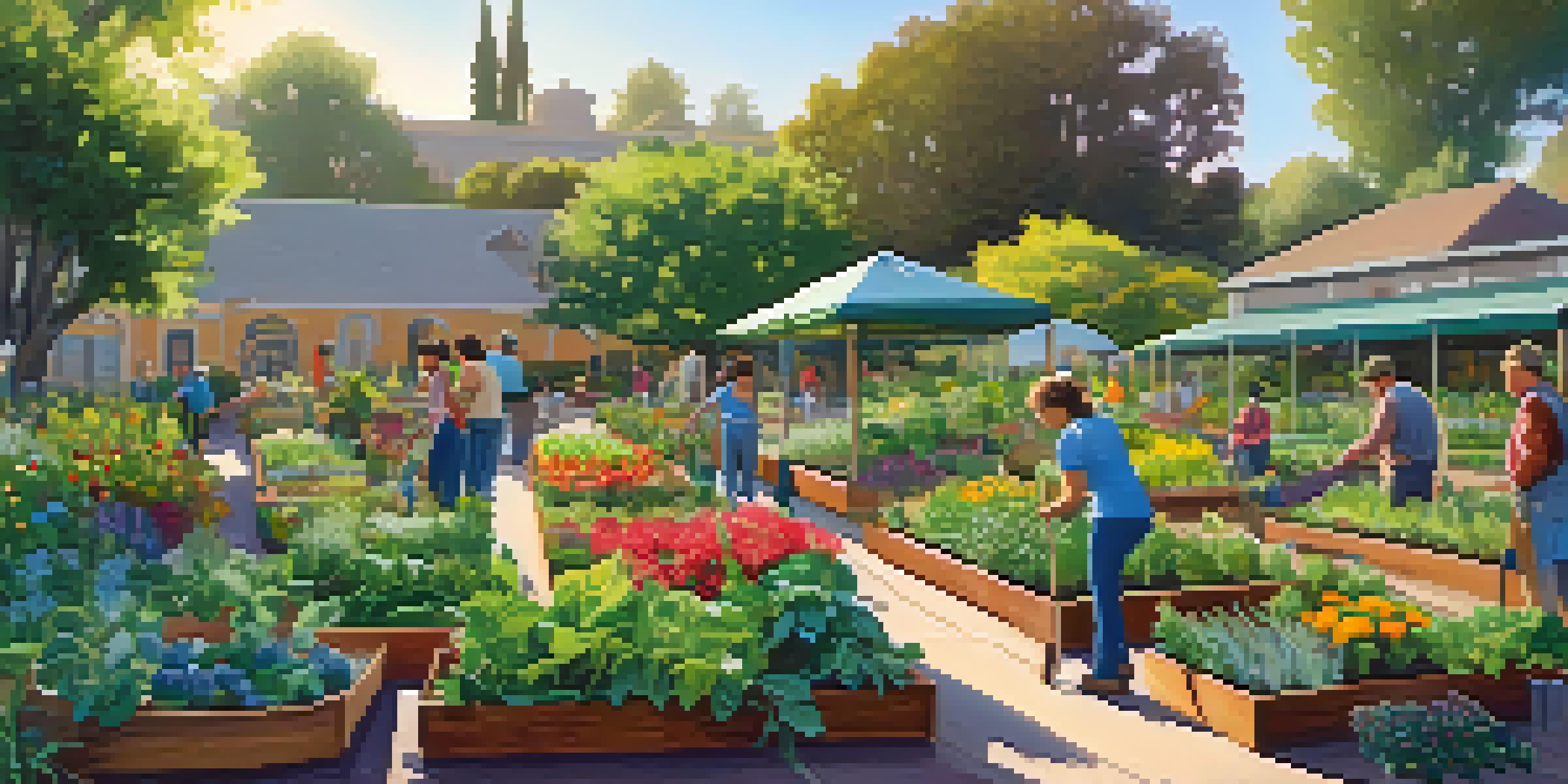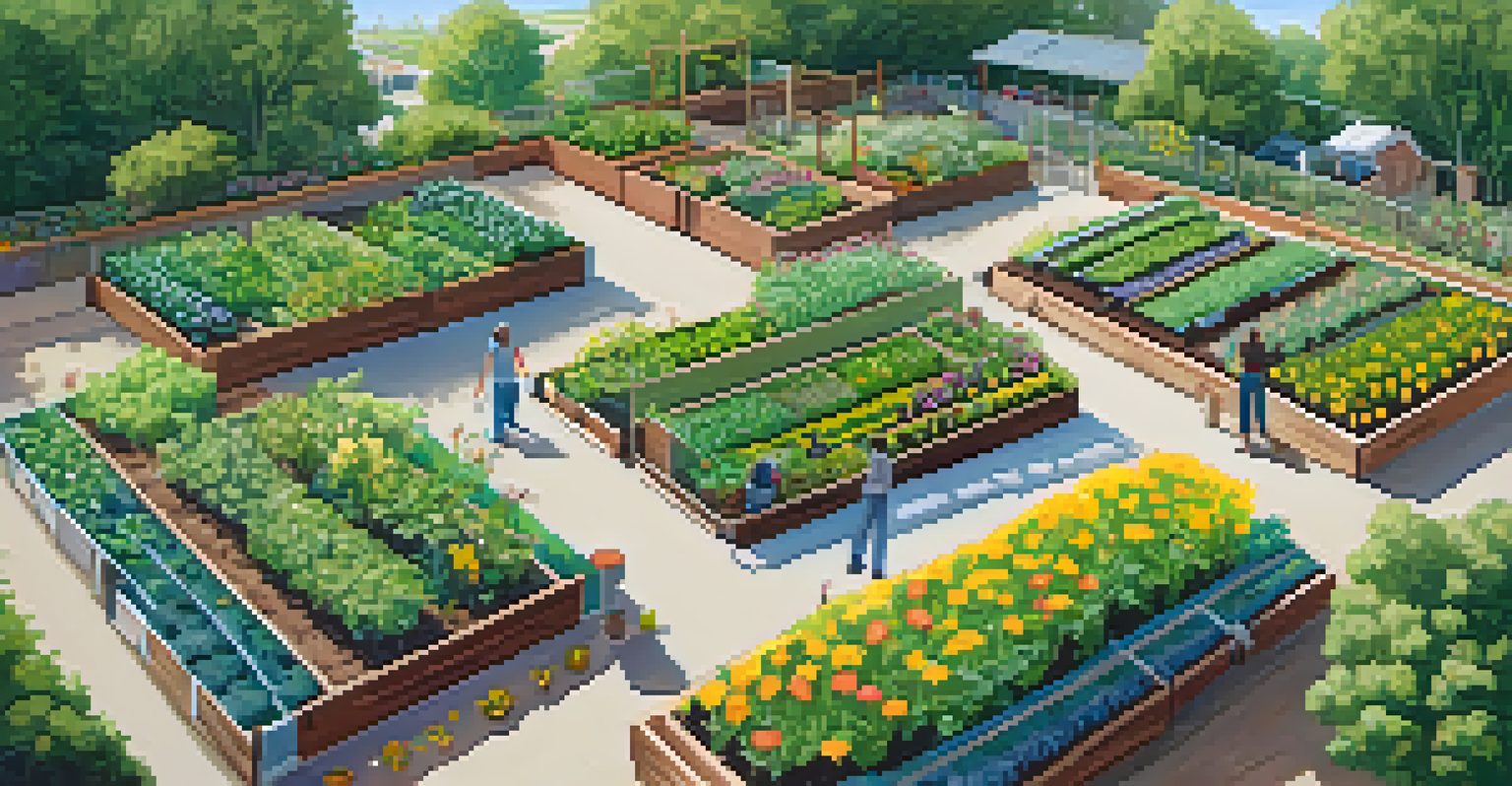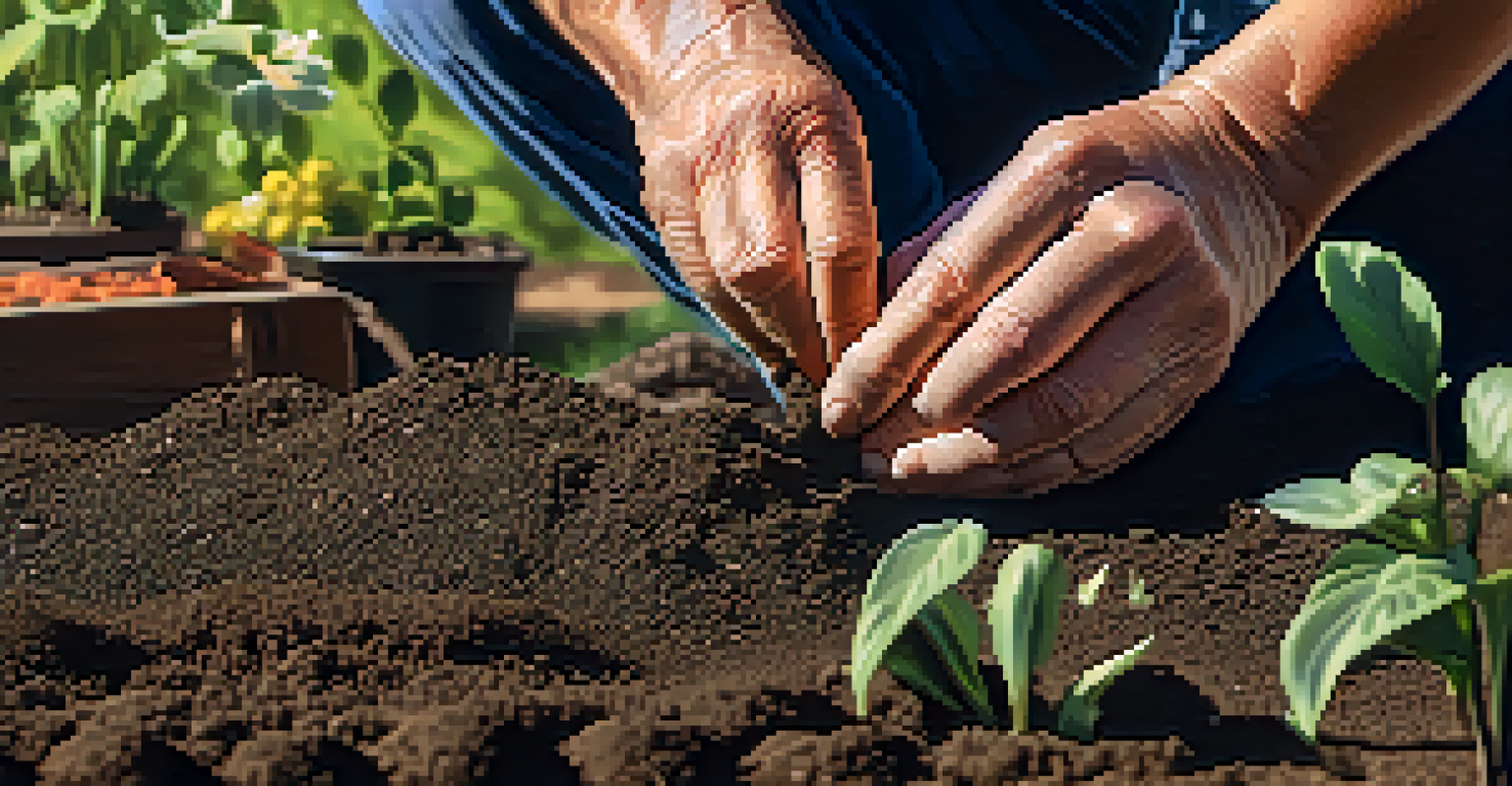Exploring Pasadena's Community Gardens: A Sustainability Hub

The Rise of Community Gardens in Pasadena
Pasadena's community gardens have blossomed in recent years, becoming vital spaces for residents. These gardens not only provide fresh produce but also foster a sense of connection among neighbors. As urban areas expand, these green oases serve as a reminder of the importance of local food systems and sustainability.
Gardening adds years to your life and life to your years.
Many community gardens have emerged from vacant lots and underutilized spaces, transforming them into productive landscapes. For instance, the Pasadena Community Garden, located in the heart of the city, showcases how grassroots efforts can lead to significant environmental and social benefits. By utilizing these spaces, residents can cultivate not just plants, but also relationships and community resilience.
Furthermore, community gardens are increasingly recognized for their role in promoting biodiversity. They create habitats for local wildlife and help to maintain the ecological balance in urban settings. As more people engage in gardening, they contribute to a sustainable future while enjoying the therapeutic benefits of nurturing plants.
Benefits of Community Gardens for Residents
Community gardens offer a myriad of benefits that go beyond just growing food. They provide a platform for education, where individuals can learn about sustainable practices, gardening techniques, and the importance of local ecosystems. Workshops and events hosted by garden members can empower residents with valuable skills and knowledge.

Moreover, these gardens foster mental well-being by creating peaceful retreats from the hustle and bustle of city life. Spending time in nature has been shown to reduce stress and enhance mood, making community gardens a sanctuary for many. The act of gardening itself can be meditative, allowing individuals to connect with the earth and themselves.
Community Gardens Foster Connection
Pasadena's community gardens create vital spaces that not only provide fresh produce but also strengthen relationships among neighbors.
Lastly, community gardens often contribute to food security in the area. By growing their own produce, residents can access fresh fruits and vegetables, reducing reliance on grocery stores. This self-sufficiency not only saves money but also encourages healthier eating habits, ultimately leading to a more sustainable lifestyle.
Diversity in Pasadena's Community Gardens
One of the most remarkable aspects of Pasadena's community gardens is their diversity. They feature a wide range of plants, reflecting the cultural backgrounds and culinary preferences of the gardeners. From traditional herbs to exotic vegetables, these gardens showcase the rich tapestry of the community's heritage.
The greatest gift of the garden is the restoration of the five senses.
For instance, the Villa Parke Community Garden includes plots dedicated to growing Asian vegetables, providing a taste of home for many immigrants. This diversity not only enriches the local food scene but also promotes cultural exchange among residents. Visitors can often discover new recipes and gardening techniques from their neighbors.
This blend of cultures fosters a sense of belonging and inclusivity, creating a welcoming atmosphere for everyone. By participating in these gardens, individuals can share their stories and traditions, further strengthening community bonds. It's a beautiful reminder that gardening is a universal language that transcends boundaries.
Sustainable Practices in Pasadena's Gardens
Sustainability is at the core of Pasadena's community gardens, with many adopting eco-friendly practices. Composting, water conservation, and organic gardening methods are common features that promote environmental stewardship. These practices not only benefit the gardens but also serve as models for sustainable living in the community.
For example, rainwater harvesting systems are often implemented to minimize water usage and promote self-sufficiency. Garden members learn how to collect and store rainwater, making their gardens more resilient to drought conditions. This hands-on experience equips residents with the tools to make sustainable choices in their own homes.
Sustainability is Key in Gardening
Many community gardens in Pasadena adopt eco-friendly practices like composting and water conservation to promote environmental stewardship.
Additionally, community gardens often prioritize native plants, which require less water and are more resilient to local pests. By planting native species, gardeners can support local wildlife and contribute to the preservation of Pasadena's natural ecosystems. It's a win-win situation that highlights the importance of sustainable practices in urban gardening.
Community Engagement and Volunteerism
Community gardens thrive on the spirit of collaboration and volunteerism. Many gardens rely on the efforts of dedicated volunteers who contribute their time and skills to maintain and improve the space. This sense of collective responsibility helps foster a strong sense of community ownership and pride.
Events such as garden clean-ups, potlucks, and workshops provide opportunities for residents to come together and strengthen their bonds. These gatherings not only enhance the garden's appearance but also create lasting friendships among participants. As people work side by side, they share laughter, stories, and a commitment to sustainability.
Furthermore, engaging youth in gardening activities can instill values of responsibility and teamwork from a young age. Schools often partner with community gardens to incorporate gardening into their curriculum, teaching children about nutrition, ecology, and the importance of local food systems. This engagement is crucial for building a sustainable future.
Challenges Facing Community Gardens
While community gardens offer numerous benefits, they also face challenges that can hinder their growth and sustainability. One of the most pressing issues is securing land access, as many gardens operate on leased or borrowed land. Rising property values and urban development can threaten these green spaces, leading to uncertainty for gardeners.
Moreover, maintaining a diverse and engaged community can be difficult. As residents move in and out of neighborhoods, gardens may struggle to retain active members. This turnover can impact the continuity of projects and the overall health of the garden, making it essential for organizers to foster a welcoming and inclusive environment.
Diversity Enriches Local Gardens
The variety of plants in Pasadena's community gardens reflects the cultural backgrounds of residents, fostering inclusivity and cultural exchange.
Finally, funding and resources can pose significant challenges for community gardens. Many rely on grants and donations to cover expenses such as tools, seeds, and maintenance. Establishing partnerships with local businesses and organizations can help alleviate some of these financial pressures, ensuring the gardens can thrive despite challenges.
The Future of Community Gardens in Pasadena
As awareness of sustainability grows, the future of community gardens in Pasadena looks promising. More residents are recognizing the importance of local food production and the benefits of green spaces in urban areas. This shift in mindset is likely to encourage the establishment of new gardens and the expansion of existing ones.
Additionally, community gardens can play a critical role in addressing climate change by promoting biodiversity and reducing carbon footprints. By engaging in sustainable practices, Pasadena's gardens can serve as examples for other cities looking to enhance their resilience. This is not just about growing food; it's about cultivating a sustainable future.

In the coming years, there's potential for increased collaboration between community gardens and local government initiatives. This partnership can lead to better access to resources, funding, and support for garden projects. As these gardens continue to flourish, they will undoubtedly remain integral to Pasadena's identity and commitment to sustainability.